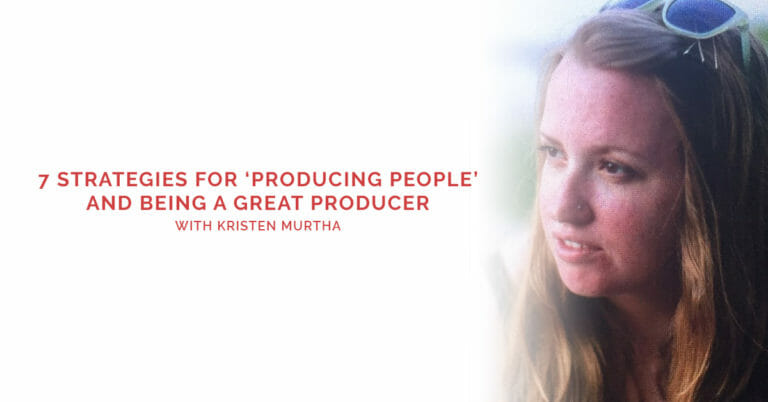By Rebecca Norris · January 28, 2019

In film school, you’re sure to learn all the producing how-to’s: how to schedule a movie, write a script, sell a script, distribute a film. Yet that’s only part of what it entails to be a producer. The part they often don’t teach is the “managing people” part of the job—working with other creatives, choosing the right projects and partners, handling difficult situations, dealing with conflict on set, being a leader, and inspiring everyone on your team to do their best work.
In her new video on TSL 360, producer Kristen Murtha, currently a production executive at Warner Brothers, explores leadership strategies for producers and gives concrete tips on how to ‘produce people’ effectively and run a positive and efficient set. Kristen’s producing credits include The Oath (Ike Barinholtz, Tiffany Haddish), Band Aid (Fred Armisen), The LEGO Ninjago Movie (Warner Bros), and The LEGO Movie 2: The Second Part (Warner Bros).
If you don’t already have a TSL 360 membership, be sure to join TSL 360 for a FREE 3-day trial membership! TSL 360 is the LARGEST screenwriting education content library where you can learn from the best in the biz, featuring dozens of masterclasses, deep-dive interviews and lectures from Academy Award-winning screenwriters, Emmy-winning TV writers, producers, agents, major studio executives – all in one place.
Here’s a taste of some of the amazing information in Kristen’s video.
Kristen emphasizes that self-awareness is key, “…not just in being a producer in the business, but in life in general… understanding what it is that gives you the capacity to be a leader. What are your strengths, what are your weaknesses? So that you are walking into the making of something with a fully open vision of the role you play and the types of roles you’re going to need other people to play with you.” (2:21-2:52)
It seems the term “producer” is tossed around Hollywood like hot cakes. So what really is a producer, and what does a producer do? According to Kristen, “There are a zillion definitions of this across the board. You have the producers who bring the money to the table… the producers that are the line producers—the on-the-ground, day-to-day folks—you have the producers that bring a cast attachment and suddenly that entitles them to a lot of money.
But to me, more than anything, and more than sort of those task-oriented sorts of definitions, a producer is a facilitator. My job is that I’m bringing people, money, and ideas together in an ideally conditioned environment with an eye toward the same goal.” (3:32-4:15)
First things first—if you want to be a producer, you’ll need to find some projects to produce. As Kristen says, “The first rule that I used throughout my entire career… is ‘one for me, one for my bank account.’ Meaning I have one thing that I’m making because I have to pay my bills, and maybe I don’t care too much about it from a creative standpoint… and then one that’s for me—one that’s fulfilling. That might be an indie film or a documentary or a short film. And if I’m making any money it’s certainly not enough to be sustaining. And I try to strike that balance… so that I try to stay creatively fulfilled but also pay my rent on time.” (4:42-5:36)
In her presentation, Kristen talks about “imposter syndrome,” or the feeling that you are in above your head, along with anxiety that you’ll be unmasked as a fraud. Speaking from her experience, “The second [rule] that I use, and this is for me, from my perspective, being a woman in the industry, is to not be afraid to run with the big boys. Meaning you walk into a conference room; it’s full of these old white dudes who have been producing for forty years.
Trust that the fact that you’ve been invited into the room in the first place validates your spot there… it’s so easy to feel like ‘Oh, gosh, I have no idea what I’m doing in this room.’… The point is to just remind yourself that you’ve earned that spot in that conference room, at that table, in that meeting.” (5:40-6:30)
Always make sure you’ve thoroughly vetted anyone that you’re considering working with on a film project. As Kristen advises, “…When I sign onto a movie as a producer, I am essentially entering into a marriage with my director. And with my financiers. I’m going to have a years-long relationship with these people, where we’re talking daily, hourly… you have to make sure that these people that you’re partnering with are people that you can have that sort of long-term relationship with… Choose wisely.” (7:30-8:06)
Kristen stresses the importance of (attempting to) have a work-life balance and not put too much on your plate. “It’s really easy to commit to lots of projects and to say ‘yes’ to lots of different things,” she says. “But it’s important that when you’re committing to a project that you can give all of your energy toward it and do your best work. You never want to be in a situation where you’re setting yourself up to fail or not be as successful as you could be… I think it’s a skill that comes over time.” (9:00-9:38)
In her video, Kristen gives several fantastic tips on how to work with people, especially your bosses and those above you in the hierarchy, which she calls “managing up.” One such technique is to “read the room” when you’re in meetings with higher-ups. “You have people you’re gonna work for… your bosses… the people who are writing the checks… when you’re in the room with these folks…[determine] where does the power sit? Who can constantly interrupt other people and get away with it? Who are people deferring to?… Who is the person making the bulk of the decisions?” she asks. “…You need to sort of cater yourself toward that person or group of people as you’re communicating whatever message you need to get across.”
She also details how to present in the room when it’s your turn to speak. “You also need to understand when you have your audience and when you’ve lost it. Are people listening to me, making eye contact…nodding along…or am I completely missing them and do I need to double back and re-explain something?… Just trying to understand, that person who has the power in the room, what messages are they looking to receive from you?”
Two other strategies Kristen uses are “Fake It ‘til You Make It” and “I Don’t Know, But I’ll Find Out.” When talking to a higher-up, you may not know the intricacies of something he or she is talking about, but you can always write it down and research it later so that you are up to speed quickly, while saving face. And if you truly don’t know something, you can say, “I don’t know, but I’ll find out,” so it’s clear you’re taking the initiative to work on it and find out the correct answer. (9:39-11:23)
Want more helpful producing strategies? In Kristen’s presentation on TSL 360, she dives much further into how to ‘produce people’ by teaching how to build a filmmaking team, manage different personality types, adapt your communication style to fit the situation, lead effectively, handle conflict, stay positive, and most of all, keep your team coming back time and time again.
8 Keys to Unlocking Hollywood Gatekeepers from Producer Sandra Leviton
4 POV’s on Finding the Emotional Core of Your Story
4 Top Reps Reveal How to Get an Agent or Manager
5 Ways to Break In as a TV Writer
How to Write a Script That Sells: 4 Industry Perspectives

 Rebecca Norris is a producer, writer, and filmmaker with her production company, Freebird Entertainment. Her recent award-winning feature film, Cloudy With a Chance of Sunshine, has been distributed on Amazon Streaming and DVD. Rebecca is also a script analyst and consultant who has read for many companies, including Sundance, ScreenCraft, Bluecat, and the International Emmys, as well as her own script consultancy, Script Authority. Rebecca blogs for Screencraft, The Script Lab, WeScreenplay and Script Magazine, exploring the film writing and production process and encouraging writers to produce their own work. Follow Rebecca’s posts on Twitter at @beckaroohoo!
Rebecca Norris is a producer, writer, and filmmaker with her production company, Freebird Entertainment. Her recent award-winning feature film, Cloudy With a Chance of Sunshine, has been distributed on Amazon Streaming and DVD. Rebecca is also a script analyst and consultant who has read for many companies, including Sundance, ScreenCraft, Bluecat, and the International Emmys, as well as her own script consultancy, Script Authority. Rebecca blogs for Screencraft, The Script Lab, WeScreenplay and Script Magazine, exploring the film writing and production process and encouraging writers to produce their own work. Follow Rebecca’s posts on Twitter at @beckaroohoo!
For all the latest from The Script Lab, be sure to follow us on Twitter, Facebook, and Instagram.